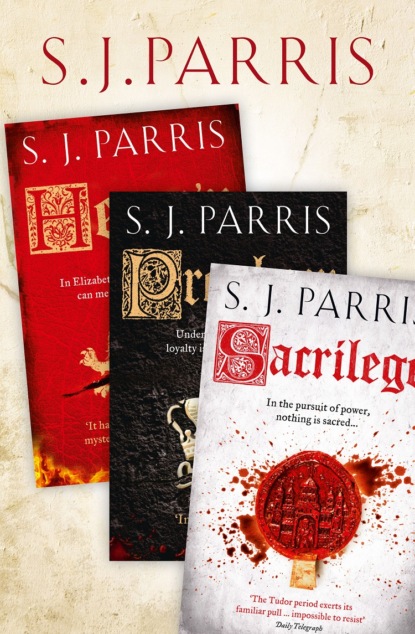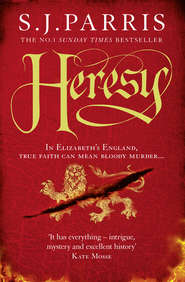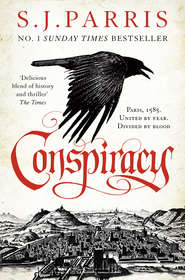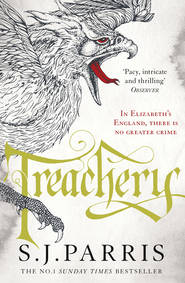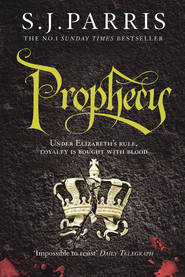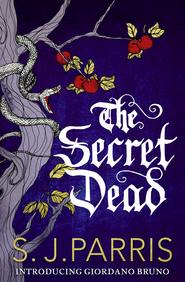По всем вопросам обращайтесь на: info@litportal.ru
(©) 2003-2025.
✖
Giordano Bruno Thriller Series Books 1-3: Heresy, Prophecy, Sacrilege
Автор
Год написания книги
2019
Настройки чтения
Размер шрифта
Высота строк
Поля
‘Three nights ago, the day I so shamefully accosted you in the quadrangle on your arrival, sir, I learned something about my father.’ He stopped with a heavy sigh just as a young pot-boy appeared with the tankards of beer and bread. I thought of Humphrey Pritchard and his snatches of Latin, and remembered I must also find a way to speak with him again. Thomas had buried his face in his beer mug as if he had not had a drink in days. I waited for him to put it down before continuing as casually as I could with my questions.
‘You are in touch with your father, then?’
‘We write to one another,’ Thomas said, ‘though of course you may imagine our letters are all monitored, at the earl’s request. My father resides at the English College of Rheims, where all the seminary priests are trained for the English mission, so any letters that come out of that place are deemed to be of great interest. And since I am assumed to share his views, they are waiting for me to betray myself in one of my letters to him. They watch me at every turn – everyone I meet or speak to. They will probably interrogate me about this –’ he gestured to the table between us – ‘when they find out.’
‘Who are “they”?’ I prompted, pausing to take a drink from my own cup. ‘Who intercepts your letters?’
‘The rector. And Doctor Coverdale. He wanted me sent down from the college after my father was exiled – he argued fiercely that allowing me to stay would imply that the college tolerated papists.’
His tone was resentful, but I watched his face carefully and could detect no sign that he knew the man he spoke of was recently dead.
‘But you are not a papist?’ I prompted.
‘I am the son of one, so they assume my loyalty to England is compromised. Eventually the rector decided I could keep my place, but Coverdale argued that I should not continue at the expense of the college, so I lost my scholarship. I do not fool myself that the rector felt sorry for me – I suppose he thought my correspondence with my father would be useful.’ He gave a bitter little laugh. ‘It must be a terrible disappointment to them – he writes to me only of the weather and his health, and I write of my studies. We dare not say anything beyond that. And then it is rumoured that the Earl of Leicester has placed a spy in the college already, so fearful are they of the secret influence of papists.’
‘A spy? Is there any truth in that?’ I asked, leaning in more keenly.
‘I do not know, sir. But then, if he were any good as a spy, I should not know him, should I?’
‘So you do not share your father’s faith?’
Thomas met my eye with a level stare as if challenging me to contradict him.
‘No, sir, I do not. I spit on the pope and the Church of Rome. But I have sworn so until I am hoarse with saying it, and still I am suspected, so what is the point?’
I waited for a moment until he had finished chewing, watching him with my elbows propped on the table and my chin resting on my clasped hands.
‘What was it you learned of your father three days ago?’ I asked. ‘Is he ill?’
Thomas shook his head, his mouth bulging.
‘Worse than that,’ he said bitterly, when he could speak again. ‘He is—’ He broke off, a piece of bread halfway to his mouth, looking at me then as if he had only just realised who I was. His anxious eyes flicked keenly over my face as he calculated whether or not I could be trusted. ‘You swear you will not repeat this to a soul?’
‘I swear it,’ I said, nodding sincerely and holding his gaze as steadily as I could manage.
He considered for a moment, still searching my eyes, then nodded tightly.
‘My father will not return to England now or ever, even if Queen Bess herself were to write assuring him of his pardon.’
‘But why not?’
‘Because he is happy,’ Thomas said, pronouncing the last word with undisguised anger. ‘He is happy, Doctor Bruno, because he has found his vocation. Sometimes I think he chose to be found out at Lincoln, so that he could finally confess his faith openly. When he writes to me now, he has to dictate the letters to a scribe – do you know why?’
I briefly shook my head and he continued, without waiting for an answer,
‘Because he was interrogated by the Privy Council. They had him hung by the hands from metal gauntlets so his feet could not touch the ground for eight hours at a time, until he passed out, and still he told them nothing. He has more or less lost the use of his right hand. But I think he would gladly have gone to his death at the time, believing himself a martyr. Three days ago, I learned that my father is to take vows as a Jesuit priest,’ he said, in a tone that sounded almost like wry amusement. ‘The Church will have him completely, and he will forget he ever had a wife or a son.’
‘I am sure no father could do that,’ I said.
‘You do not know him,’ he said, setting his mouth in a grim line. ‘Ours is an old Catholic family, sir. But I ask you – how can a religion that talks of love at the same time urge men so cruelly to cast aside the natural ties of love and friendship? To martyr themselves for the promise of an unseen world, and leave their families grieving! I want no part of any God that demands those sacrifices.’
He had shredded what remained of his bread into tiny pieces with his agitated fingers as he spoke. He reached forward to take another hunk of bread and as he did so, the frayed sleeve of his gown fell back to reveal a soiled makeshift bandage around his wrist and the lower part of his right hand, blotched with brownish stains over which a few, fresher crimson spots had blossomed more recently.
‘What happened to your hand?’ I asked.
Immediately he tugged his sleeve down over the bandage and rubbed his wrist self-consciously.
‘It is nothing.’
‘It does not look like nothing – it’s bled badly. I could look at it if you like?’
‘Are you a doctor?’ he snapped, withdrawing his arm hastily as if afraid I might tear the bandage off without his consent.
‘Only of theology,’ I admitted, ‘but I did learn a little of the art of making salves when I was a monk. It would be no trouble to examine it.’
‘Thank you, but there is no need. It was just a foolish accident. I was sharpening Gabriel’s razor for him and my hand slipped.’ He looked down and gave his whole attention to the bread as if the subject was closed. I felt myself tense, but tried to give no sign that I found his words significant.
‘Your friend Master Norris does not use the college barber, then?’ I asked, in a neutral tone.
Thomas ventured a smile.
‘He calls him the college barbarian. No, he prefers to do the job himself.’
‘When did he ask you to sharpen his razor?’
Thomas thought for a moment.
‘It must have been Saturday, because he wanted to shave before the disputation.’
‘And has it been in its usual place since then?’
‘I – I don’t know, sir. I have not looked. Why would it not be?’
He looked at me, his brow creased with curiosity, and I thought it best not to arouse his suspicions further.
‘I only wondered if Master Norris ever lent the razor to his friends.’
‘Never, sir. He is careful with his possessions. Many of them are valuable, or else they came from his father.’
He didn’t ask any further, but continued to regard me with curiosity. After we had sat for a while in silence, I put down my bread and wiped my fingers.
‘But this news of your father – you did not learn it directly from him, if his letters are intercepted? He would surely not have written to you of his plans to take holy orders.’
‘No, he had another correspondent,’ Thomas said with his mouth full.
‘Had?’
He stopped and his eyes flickered guiltily upwards towards mine as he realised his slip.





